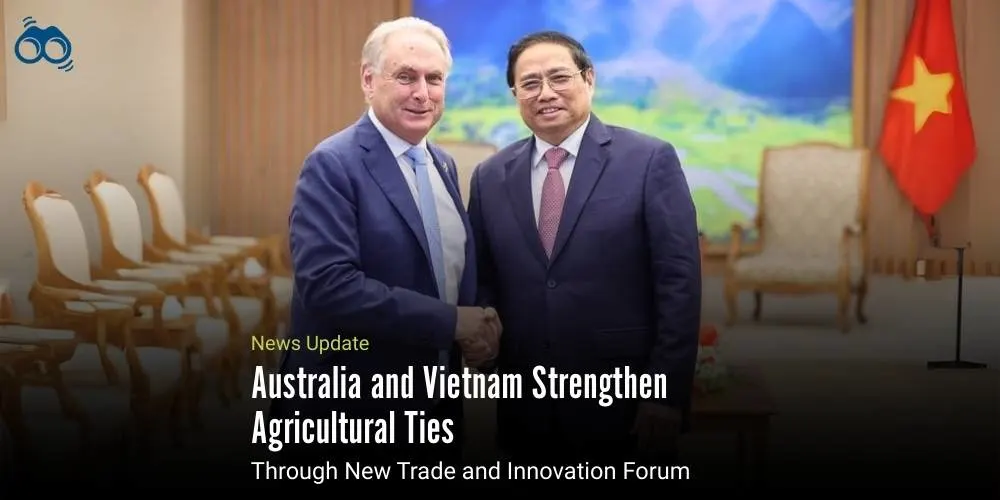Australia and Vietnam Advance Collaboration in Green Economy and Digital Transformation
Bilateral Forum Showcases Australian Innovation in Agriculture, Energy, and Education
Susan Kahwati, an Investment Commissioner at the Australian Trade and Investment Commission (Austrade), currently leads initiatives in the Green Economy and Agrifood Trade. Her work focuses on advancing Australia’s international partnerships in sustainable agriculture, food systems, and trade innovation. With a background that includes a Bachelor of Pharmacy from Sydney University and an MBA from the Australian Graduate School of Management, she brings both technical and strategic expertise to her role. In addition to her core responsibilities, she has served as a facilitator for international education forums and held board positions with the Australian-Thai Chamber of Commerce, further strengthening her engagement in regional diplomacy.
At a recent bilateral forum, Kahwati, representing the Australian Government’s Trade and Investment Agency, reportedly emphasised Vietnam’s dynamic economic landscape. She highlighted that the country possesses a diverse economy, a robust agricultural sector, a youthful population, and a notably high rate of digitalisation. Taken together, these attributes were said to position Vietnam as a strategic partner in the Indo-Pacific region. In particular, she underscored Vietnam’s potential in areas requiring innovation, resilience, and scalable development, sectors where Australia seeks deeper collaboration.
Australian officials were understood to have reiterated their government’s commitment to deepening economic cooperation with Vietnam across multiple sectors. Agriculture, food systems, natural resources, green energy, infrastructure, education, and the digital economy were identified as priority domains. Observers suggested that this multi-sectoral approach reflected Australia’s broader regional strategy, which seeks to balance trade interests with sustainable development goals and climate adaptation. During the forum, several Australian universities and businesses were reported to have showcased a range of products and technologies tailored to Vietnam’s evolving needs. These included agricultural risk management tools, advanced soil moisture monitoring systems, financial services designed to support import-export activities, organic fertilisers, and biodegradable waste solutions. Analysts noted that such innovations aligned with both countries’ shared interest in climate-smart agriculture and circular economy models.
Commentators highlighted that Vietnam’s young and tech-savvy population could accelerate the uptake of these technologies, especially in rural and peri-urban areas. Comparisons were drawn with other ASEAN nations, where digitalisation has similarly driven agricultural modernisation and fintech expansion. It was further observed that Vietnam’s strategic location within global supply chains made it an attractive destination for Australian investment, particularly in agritech and clean energy. Policy experts pointed out that the forum also served as a platform for discussing transnational education and research collaboration. Australian universities were said to be exploring joint degree programmes, vocational training partnerships, and mobility schemes aimed at strengthening institutional ties. Education was described as a form of soft diplomacy, with the potential to build long-term capacity and foster mutual understanding.
Financial analysts suggested that the presence of Australian financial service providers signalled growing interest in facilitating cross-border trade and investment. Small and medium-sized enterprises (SMEs) were expected to benefit from improved access to credit, risk mitigation tools, and digital payment systems tailored to regional markets. The forum appeared to reaffirm Australia’s strategic intent to engage Vietnam not only as a trade partner but also as a collaborator in innovation, education, and sustainable development.
Editor’s Note
Susan Kahwati, Austrade's Investment Commissioner, discusses Australia's expanding collaboration with Vietnam in this article.. She pointed out Vietnam’s strong agricultural sector, young population, and fast digital growth, showing why the country is becoming more important in the Indo-Pacific region. The forum was not only a place for talks but also for showcasing practical innovations such as agritech, biodegradable products, financial services, and education partnerships. The participation of Australian universities and businesses showed a broad approach to cooperation. Special focus was given to climate-smart farming, circular economy models, and education links. Vietnam’s young workforce and readiness for digital adoption were seen as strong advantages for future collaboration. The discussions also showed Australia’s aim to connect trade with sustainability, making education and innovation central to long-term stability.
As per Skoobuzz, this cooperation comes at a time when global supply chains are shifting, climate challenges are rising, and Southeast Asia needs inclusive growth. By combining expertise, policies, and local skills, Australia and Vietnam are working towards strong and future-focused partnerships.














0 Comments (Please Login To Continue)